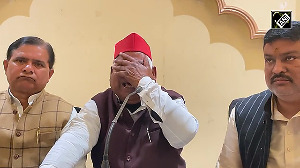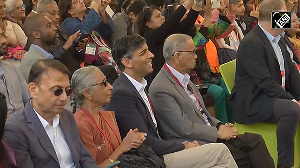While speaking to industrialists at a public function recently, Bharatiya Janata Party leader L K Advani suddenly became quite emotional. He almost broke down, as he was reading lines from a poem during the course of his speech. For long, Advani has sported the image of a hawk. It was left to Vajpayee to indulge in poetry and emotion. But those close to Advani will tell you that he is sensitive and gets easily hurt and upset. Now we are getting an insight into the poetic heart of Advani. It seems like he wants to now be cast in the mould of Vajpayee and acquire a 'moderate' image he has coveted for years.
Rajnath Singh on the other hand is trying to zero into the space that was once occupied by Advani. There can no other explanation for Singh trying to revive a debate on secularism at the party's recent national executive meet. It could hardly be called a debate with the party chief taking exception to the Hindi translation of the word secularism. The word 'dharmanirpekshta', he felt, should be replaced by 'pantnirpekshta'. The issue was not of earthshaking importance, not even from the BJP's point of view. It was so peripheral, coming as it did from the president of the party which is projecting itself as a claimant to the Delhi throne in 2009. More so, at a time when the government finds itself on the backfoot on prices.
Given the BJP's history, Rajnath Singh's call was bound to make headlines the next day, pushing other issues to the background -- which is precisely what happened.
More so as he was making his observations soon after the victory in Karnataka, where the party had won on issues of governance and leadership, and not on the plank of, say, a temple. Karnataka has been a defining moment for the BJP. Just as the BJP had made a point in 1996, that it was capable of coming to power at the Centre, even though it was only for 13 days, so also it made the point through Karnataka that it is now a pan Indian entity like the Congress, in power in seven states on its own and in 12 with allies, and is out to replace the Congress at the Centre.
What is more, Karnataka -- and before it Gujarat -- have shown that the party is on the upswing once again, retaining old ground and capturing new territories after having plateaued between 2000-04. This is in contrast to the Congress which is unable to recapture areas it once held and is losing state after state.
The Delhi meet was therefore a momentous occasion for the party to go for broad brush strokes instead of quibbling about translations. The only explanation why Rajnath Singh may have resorted to it was to try and project himself as the party's new hawk, its Advani II. He was obviously playing to the gallery that constitutes his base -- the Rashtriya Swayamsevak Sangh, which put him in the saddle and which needs to be reassured from time to time that the party under Singh is not becoming adrift from its moorings. And to its hardcore Hindutva supporters, who are supposed to add up to roughly 18 percent of the party's vote base.
Though Singh is trying to be the Advani of yesteryears, he is not yet accepted as number two. Advani was unambiguously the second in command after Vajpayee.
Rajnath Singh has to contend with other rivals from Gen X -- particularly Narendra Modi, who Advani claimed as his successor. There is Arun Jaitley, who has emerged as the master strategist of the party after the string of victories in state elections. Though he may not have a state under his belt like Modi, nor has he fought an election, he has the advantage of an image that is moderate, an imperative in the age of coalitions.
The tension amongst the Gen X leaders is an open secret, and there was heartburn over who got maximum credit for the victory in Karnataka. That is why Advani made a point of thanking each one of them by name in his speech at the national executive, though he failed to mention Rajnath Singh. Though the party chartered a special plane to take BJP leaders from Delhi to Bangalore for the swearing in ceremony of B S Yeddyurappa, Sushma Swaraj and Murli Manohar Joshi decided at the last moment not to go. This led Arun Jaitley, who had been the master of ceremonies of the victory, also to cry off. The plane, reportedly chartered at the cost of Rs 27 lakhs, finally carried only Advani, Bhairon Singh Shekhawat, Punjab, Uttarakhand and Gujarat CMs Parkash Singh Badal, B C Khanduri, and Narendra Modi and younger BJP leaders.
While most of the Gen X leaders are aligned to Advani, Rajnath Singh has been building up his own confidantes and he singled out Yashwant Sinha with an appreciative word. In recent months he has projected his own favourties in the third rung of leadership, people like Mukhtar Abbas Naqvi and Rajiv Pratap Rudy.
Advani's search to find ways and means to add to the party's core vote had started soon after the 2004 defeat. He wanted to target the liberal Hindu, who had swerved to the BJP in 1998 and 1999, under the "Ab ki baari Atal Bihari" and "Inko bhi dekh liya jaye" slogans.
Now that the Vajpayeeisation of Advani is complete. Advani is speaking more of an inclusive agenda, of winning over Dalits and tribals (they voted for the BJP in Karnataka), and more importantly, Muslims and Christians. The party has made a point of including a Muslim in the Yeddyurappa cabinet, even though he did not contest the elections. In a recent TV interview, Advani held forth on how the party had decided to field Shahnawaz Hussain in Bhagalpur, Bihar in preference to many other good candidates and he won. He had also expressed displeasure in party circles at some of Rajnath Singh's remarks about Muslims at the party's minority front meeting in Hyderabad.
Even as these intra party skirmishes go on, at a wider level, Rajnath Singh and L K Advani are moving in a parallel fashion, towards the attainment of the same goal, like Vajpayee and Advani, for all their rivalries, did in the past. Both played to different galleries, one to the moderate opinion, and the other to the Hindutva spectrum. The only difference between then and now is that Advani has taken the place of Vajpayee and Rajnath Singh is trying to occupy the place that Advani once held.






 © 2025
© 2025